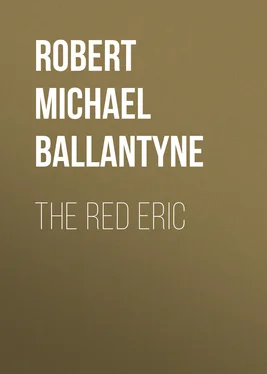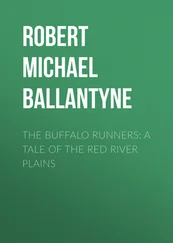Robert Michael Ballantyne - The Red Eric
Здесь есть возможность читать онлайн «Robert Michael Ballantyne - The Red Eric» — ознакомительный отрывок электронной книги совершенно бесплатно, а после прочтения отрывка купить полную версию. В некоторых случаях можно слушать аудио, скачать через торрент в формате fb2 и присутствует краткое содержание. Жанр: Детские приключения, literature_19, foreign_antique, foreign_prose, foreign_children, на английском языке. Описание произведения, (предисловие) а так же отзывы посетителей доступны на портале библиотеки ЛибКат.
- Название:The Red Eric
- Автор:
- Жанр:
- Год:неизвестен
- ISBN:нет данных
- Рейтинг книги:4 / 5. Голосов: 1
-
Избранное:Добавить в избранное
- Отзывы:
-
Ваша оценка:
- 80
- 1
- 2
- 3
- 4
- 5
The Red Eric: краткое содержание, описание и аннотация
Предлагаем к чтению аннотацию, описание, краткое содержание или предисловие (зависит от того, что написал сам автор книги «The Red Eric»). Если вы не нашли необходимую информацию о книге — напишите в комментариях, мы постараемся отыскать её.
The Red Eric — читать онлайн ознакомительный отрывок
Ниже представлен текст книги, разбитый по страницам. Система сохранения места последней прочитанной страницы, позволяет с удобством читать онлайн бесплатно книгу «The Red Eric», без необходимости каждый раз заново искать на чём Вы остановились. Поставьте закладку, и сможете в любой момент перейти на страницу, на которой закончили чтение.
Интервал:
Закладка:
R. M. Ballantyne
The Red Eric
Chapter One.
The Tale Begins with the Engaging of a “Tail”—and the Captain Delivers his Opinions on Various Subjects
Captain Dunning stood with his back to the fireplace in the back-parlour of a temperance coffee-house in a certain town on the eastern seaboard of America.
The name of that town is unimportant, and, for reasons with which the reader has nothing to do, we do not mean to disclose it.
Captain Dunning, besides being the owner and commander of a South Sea whale-ship, was the owner of a large burly body, a pair of broad shoulders, a pair of immense red whiskers that met under his chin, a short, red little nose, a large firm mouth, and a pair of light-blue eyes, which, according to their owner’s mood, could flash like those of a tiger or twinkle sweetly like the eyes of a laughing child. But his eyes seldom flashed; they more frequently twinkled, for the captain was the very soul of kindliness and good-humour. Yet he was abrupt and sharp in his manner, so that superficial observers sometimes said he was hasty.
Captain Dunning was, so to speak, a sample of three primary colours—red, blue, and yellow—a walking fragment, as it were, of the rainbow. His hair and face, especially the nose, were red; his eyes, coat, and pantaloons were blue, and his waistcoat was yellow.
At the time we introduce him to the reader he was standing, as we have said, with his back to the fireplace, although there was no fire, the weather being mild, and with his hands in his breeches pockets. Having worked with the said hands for many long years before the mast, until he had at last worked himself behind the mast, in other words, on to the quarterdeck and into possession of his own ship, the worthy captain conceived that he had earned the right to give his hands a long rest; accordingly he stowed them away in his pockets and kept them there at all times, save when necessity compelled him to draw them forth.
“Very odd,” remarked Captain Dunning, looking at his black straw hat which lay on the table before him, as if the remark were addressed to it—“very odd if, having swallowed the cow, I should now be compelled to worry at the tail.”
As the black straw hat made no reply, the captain looked up at the ceiling, but not meeting with any response from that quarter, he looked out at the window and encountered the gaze of a seaman flattening his nose on a pane of glass, and looking in.
The captain smiled. “Ah! here’s a tail at last,” he said, as the seaman disappeared, and in another moment reappeared at the door with his hat in his hand.
It may be necessary, perhaps, to explain that Captain Dunning had just succeeded in engaging a first-rate crew for his next whaling voyage (which was the “cow” he professed to have swallowed), with the exception of a cook (which was the “tail,” at which he feared he might be compelled to worry).
“You’re a cook, are you?” he asked, as the man entered and nodded.
“Yes, sir,” answered the “tail,” pulling his forelock.
“And an uncommonly ill-favoured rascally-looking cook you are,” thought the captain; but he did not say so, for he was not utterly regardless of men’s feelings. He merely said, “Ah!” and then followed it up with the abrupt question—
“Do you drink?”
“Yes, sir, and smoke too,” replied the “tail,” in some surprise.
“Very good; then you can go,” said the captain, shortly.
“Eh!” exclaimed the man:
“You can go,” repeated the captain. “You won’t suit. My ship is a temperance ship, and all the hands are teetotalers. I have found from experience that men work better, and speak better, and in every way act better, on tea and coffee than on spirits. I don’t object to their smoking; but I don’t allow drinkin’ aboard my ship; so you won’t do, my man. Good-morning.”
The “tail” gazed at the captain in mute amazement.
“Ah! you may look,” observed the captain, replying to the gaze; “but you may also mark my words, if you will. I’ve not sailed the ocean for thirty years for nothing. I’ve seen men in hot seas and in cold—on grog, and on tea—and I know that coffee and tea carry men through the hardest work better than grog. I also know that there’s a set o’ men in this world who look upon teetotalers as very soft chaps—old wives, in fact. Very good,” (here the captain waxed emphatic, and struck his fist on the table.) “Now look here, young man, I’m an old wife, and my ship’s manned by similar old ladies; so you won’t suit.”
To this the seaman made no reply, but feeling doubtless, as he regarded the masculine specimen before him, that he would be quite out of his element among such a crew of females, he thrust a quid of tobacco into his cheek, put on his hat, turned on his heel and left the room, shutting the door after him with a bang.
He had scarcely left when a tap at the door announced a second visitor.
“Hum! Another ‘tail,’ I suppose. Come in.”
If the new-comer was a “tail,” he was decidedly a long one, being six feet three in his stockings at the very least.
“You wants a cook, I b’lieve?” said the man, pulling off his hat.
“I do. Are you one?”
“Yes, I jist guess I am. Bin a cook for fifteen year.”
“Been to sea as a cook?” inquired the captain.
“I jist have. Once to the South Seas, twice to the North, an’ once round the world. Cook all the time. I’ve roasted, and stewed, and grilled, and fried, and biled, right round the ’arth, I have.”
Being apparently satisfied with the man’s account of himself, Captain Dunning put to him the question—“Do you drink?”
“Ay, like a fish; for I drinks nothin’ but water, I don’t. Bin born and raised in the State of Maine, d’ye see, an’ never tasted a drop all my life.”
“Very good,” said the captain, who plumed himself on being a clever physiognomist, and had already formed a good opinion of the man. “Do you ever swear?”
“Never, but when I can’t help it.”
“And when’s that?”
“When I’m fit to bu’st.”
“Then,” replied the captain, “you must learn to bu’st without swearin’, ’cause I don’t allow it aboard my ship.”
The man evidently regarded his questioner as a very extraordinary and eccentric individual; but he merely replied, “I’ll try;” and after a little further conversation an agreement was come to; the man was sent away with orders to repair on board immediately, as everything was in readiness to “up anchor and away next morning.”
Having thus satisfactorily and effectually disposed of the “tail,” Captain Dunning put on his hat very much on the back of his head, knit his brows, and pursed his lips firmly, as if he had still some important duty to perform; then, quitting the hotel, he traversed the streets of the town with rapid strides.
Chapter Two.
Important Personages are Introduced to the Reader—The Captain makes Insane Resolutions, Fights a Battle, and Conquers
In the centre of the town whose name we have declined to communicate, there stood a house—a small house—so small that it might have been more appropriately, perhaps, styled a cottage. This house had a yellow-painted face, with a green door in the middle, which might have been regarded as its nose, and a window on each side thereof, which might have been considered its eyes. Its nose was, as we have said, painted green, and its eyes had green Venetian eyelids, which were half shut at the moment Captain Dunning walked up to it as if it were calmly contemplating that seaman’s general appearance.
There was a small garden in front of the house, surrounded on three sides by a low fence. Captain Dunning pushed open the little gate, walked up to the nose of the house, and hit it several severe blows with his knuckles. The result was that the nose opened, and a servant-girl appeared in the gap.
Читать дальшеИнтервал:
Закладка:
Похожие книги на «The Red Eric»
Представляем Вашему вниманию похожие книги на «The Red Eric» списком для выбора. Мы отобрали схожую по названию и смыслу литературу в надежде предоставить читателям больше вариантов отыскать новые, интересные, ещё непрочитанные произведения.
Обсуждение, отзывы о книге «The Red Eric» и просто собственные мнения читателей. Оставьте ваши комментарии, напишите, что Вы думаете о произведении, его смысле или главных героях. Укажите что конкретно понравилось, а что нет, и почему Вы так считаете.












